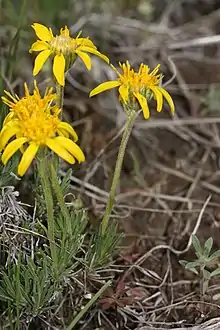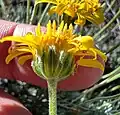| Nestotus stenophyllus | |
|---|---|
 | |
| Scientific classification | |
| Kingdom: | Plantae |
| Clade: | Tracheophytes |
| Clade: | Angiosperms |
| Clade: | Eudicots |
| Clade: | Asterids |
| Order: | Asterales |
| Family: | Asteraceae |
| Genus: | Nestotus |
| Species: | N. stenophyllus |
| Binomial name | |
| Nestotus stenophyllus (A.Gray) R.P.Roberts, Urbatsch & Neubig | |
| Synonyms | |
| |
Nestotus stenophyllus is a species of flowering plant in the family Asteraceae known by the common name narrowleaf mock goldenweed. It was previously known as Stenotus stenophyllus. It is native to the western United States, especially the inland Pacific Northwest and northern Great Basin, where it grows in sagebrush habitat usually in rocky soil.[1]
Description
Nestotus stenophyllus is a small, clump-forming perennial sub-shrub growing up to about 12 centimeters tall. Mature plants have a very low woody sprawling base from which the growing stems arise. The woody base is largely hidden by leaves, so the plant may appear to be herbaceous without close inspection. The rough-haired, glandular leaves are 1 or 2 centimeters long and linear to lance-shaped and are arranged along upright to angled stems up to 6 centimeters long, growing from short woody bases. The inflorescence is a solitary flower head atop an erect peduncle that emerges from the tip of the leaf stem. The flower has a glandular bract and several yellow disc florets each around a centimeter long and at the center many yellow disc florets. The floral bract often appears to have a fringe of long hairs near the top of each lobe, which is actually attached to the base of the florets and will form part of the seed pappus. It flowers in early spring. The fruit is a silky-haired achene tipped with a white pappus.[1]
Habitat
Nestotus stenophyllus grows mostly in dry rocky soils and is common in the shallow rocky soil of the scablands on the Columbia Plateau.[1]
Gallery
 Flower
Flower Leaves
Leaves Floral bract
Floral bract
References
- 1 2 3 "Burke Herbarium Image Collection". biology.burke.washington.edu.
External links
 Media related to Nestotus stenophyllus at Wikimedia Commons
Media related to Nestotus stenophyllus at Wikimedia Commons- Jepson Manual Treatment
- USDA Plants Profile
- Flora of North America
- Washington Burke Museum
- Photo gallery